What is behind the US-Cuba thaw?
- Published
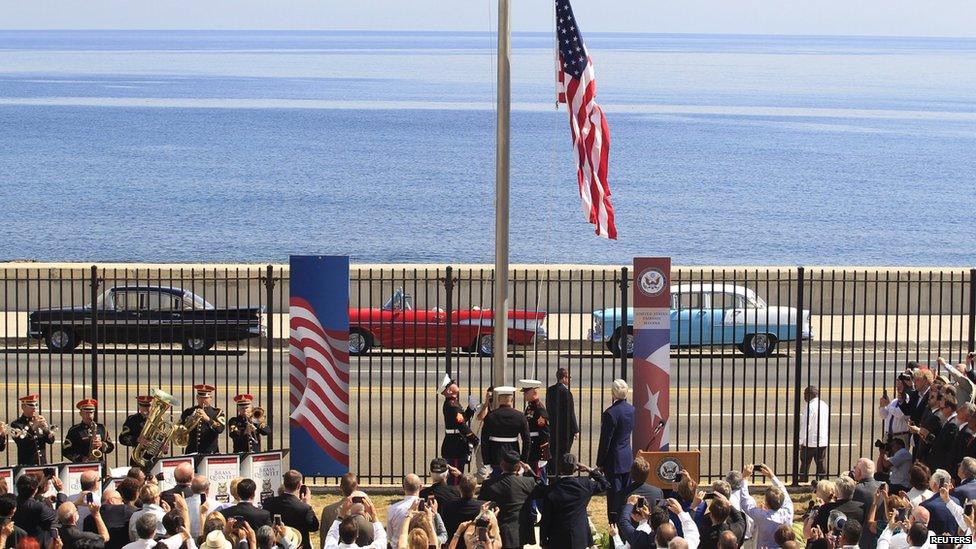
The US has reopened its embassy in Havana, bringing to an end decades of hostility between the two nations.
US President Barack Obama and his Cuban counterpart Raul Castro announced in December moves to normalise diplomatic relations between the two countries.
In a flag-raising ceremony to reopen the US embassy in Havana, US Secretary of State John Kerry called on Cuba to become more democratic.
"We remain convinced the people of Cuba would be best served by a genuine democracy, where people are free to choose their leaders, express their ideas, practice their faith," Mr Kerry told those gathered on the embassy grounds and millions of islanders watching and listening live.

Why now?
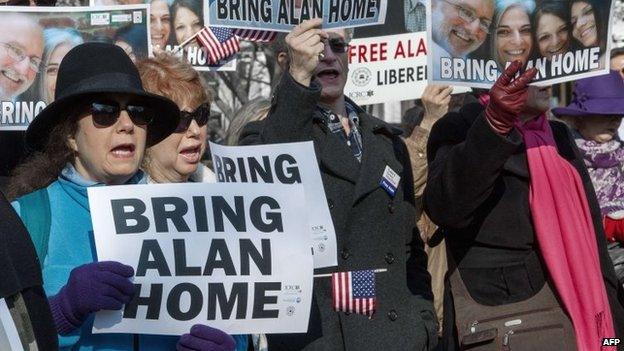
Efforts to get Alan Gross released had been going on for years
The Obama Administration had been trying to bring about the release of Alan Gross for years.
In early 2013, President Obama authorised secret talks to go ahead in Canada and the Vatican.
A major factor driving the talks was Alan Gross's deteriorating health.
If his continued detention was a major sticking point in relations between the two countries, his death in a Cuban jail would have been an almost insurmountable obstacle.
In August, his lawyer said that he did not know if Mr Gross would survive for much longer.
Pressure was therefore mounting on the Cuban government to free him before his health took another turn for the worse.
Some analysts also think the Cuban government was spurred on by the economic crisis its ally Venezuela is facing.
Venezuela and its socialist president, Nicolas Maduro, have given the Cuban government economic and ideological support for years.
But falling oil prices have hit Venezuela hard and may have raised fears in Havana that Venezuela may not be able to be as generous in the future.
A series of editorials calling for a lifting of the US embargo on Cuba published in the New York Times also signalled a shift among US opinion makers and their desire for a softening of the US stance on Cuba.

Is this a US admission of defeat?
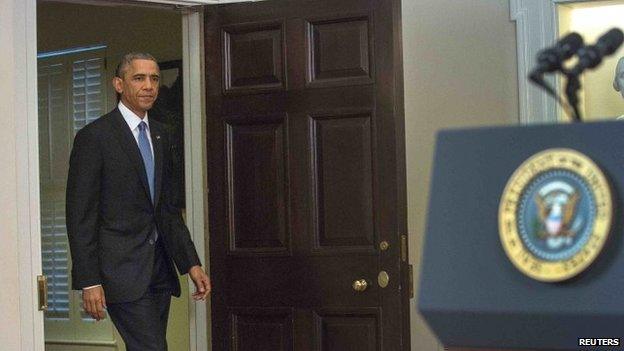
President Obama said the current policy had had little effect
President Obama did not mince his words in his speech.
He said that decades of isolation had "failed to accomplish our enduring objective of promoting the emergence of a democratic, prosperous, and stable Cuba".
While he conceded that the policy had been devised with the best of intentions, he said it had "had little effect".
But the president also made sure to couch the policy change in positive terms, saying that "we are renewing our leadership in the Americas".
Raul Castro sounded a cautious note, stressing that there were still "profound differences" between the two countries.
He delivered his speech in a very deliberate manner, with none of the triumphalist notes one could have expected on the day when a US president announced a major shift in relations with the small Communist-run island.
He also mentioned his brother Fidel Castro a number of times, implying that the talks had been given the approval of the leader of the 1959 Cuban revolution.

What does it mean for ordinary Cubans?
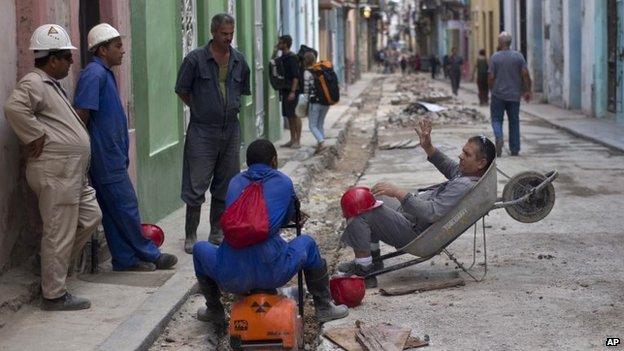
Cubans should find it easier to get construction materials to build private homes after the policy shift
Cubans have been deeply affected by the US embargo, and while its lifting is not on the cards at present, President Obama announced a series of measures that will make a difference to the lives of many Cubans.
The amount of money which can be sent in remittances will quadruple from $500 (£320) to $2,000 per quarter.
Telecom providers will be allowed to improve Cuba's infrastructure so that more Cubans can access the internet.
Currently Cuba has one of the lowest internet penetration in the world and what little there is is unaffordable for many.
Cubans will also be able to import construction materials to build private homes, a move aimed at easing the severe shortage of suitable homes on the island.
Travel restrictions to Cuba will be relaxed, making family visits and cross-border humanitarian projects easier.

How have Cuban-Americans reacted?
The two Cuban-American members of the US Senate have been scathing about the new policy.
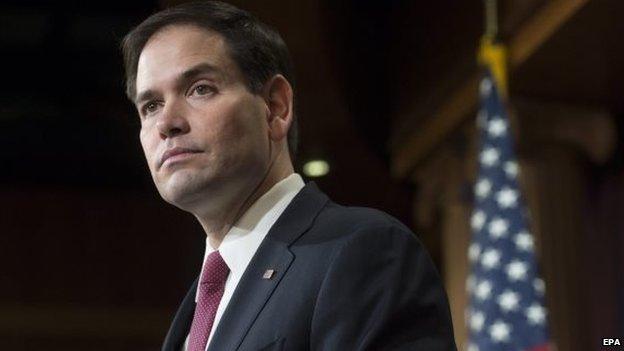
Republican Senator Marco Rubio said the changes would further bolster Raul Castro in power
Republican Senator Marco Rubio said that rather than bring about change it would go "a long way in providing the economic lift that the Castro regime needs to become permanent fixtures in Cuba for generations to come''.
His Democratic colleague Robert Menendez, who chairs the Senate Foreign Relations committee, said President Obama's actions had "vindicated the brutal behaviour of the Cuban government".
A group of Cuban-Americans took to the streets in Miami calling President Obama a traitor.
But there were also those who welcomed the policy shift.
Ric Herrero, executive director of #CubaNow, a non-partisan group which says it wants to "empower the Cuban people" said the changes would "allow the Cuban people to determine their own future and rely less on the Cuban state".

Hurdles ahead
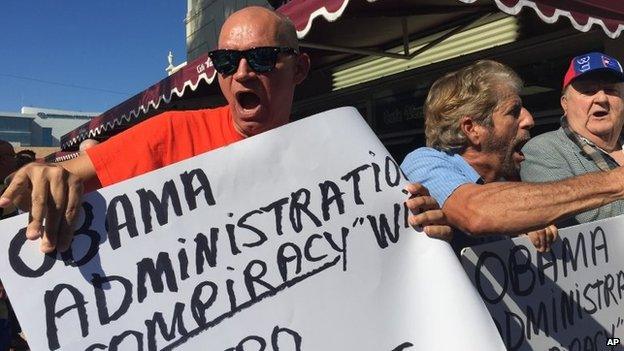
Some Cuban-Americans in Miami accused President Obama of conspiring with Raul Castro
While President Obama can take steps to normalise relations with Cuba, he cannot lift the embargo without the approval of the US Congress.
He is likely to face stiff opposition from representatives from Florida, where many Cuban exiles who fled Castro's Cuba settled.
Mario Diaz-Balart, a Republican Congressman from Florida, accused Mr Obama of being the "appeaser-in-chief who is willing to provide unprecedented concessions to a brutal dictatorship that opposes US interests at every opportunity".
But there are also those like Senator Dick Durbin who are hopeful that the change will "create a force for positive change in Cuba that more than 50 years of our current policy of exclusion could not achieve".
While some of the practical measures announced on Wednesday are likely to ease Cubans' lives quite quickly, more lasting change was going to take time, the president said.
"I do not expect the changes I am announcing today to bring about a transformation of Cuban society overnight."
But he said he was hopeful that a policy of engagement rather than isolation would "help the Cuban people help themselves".